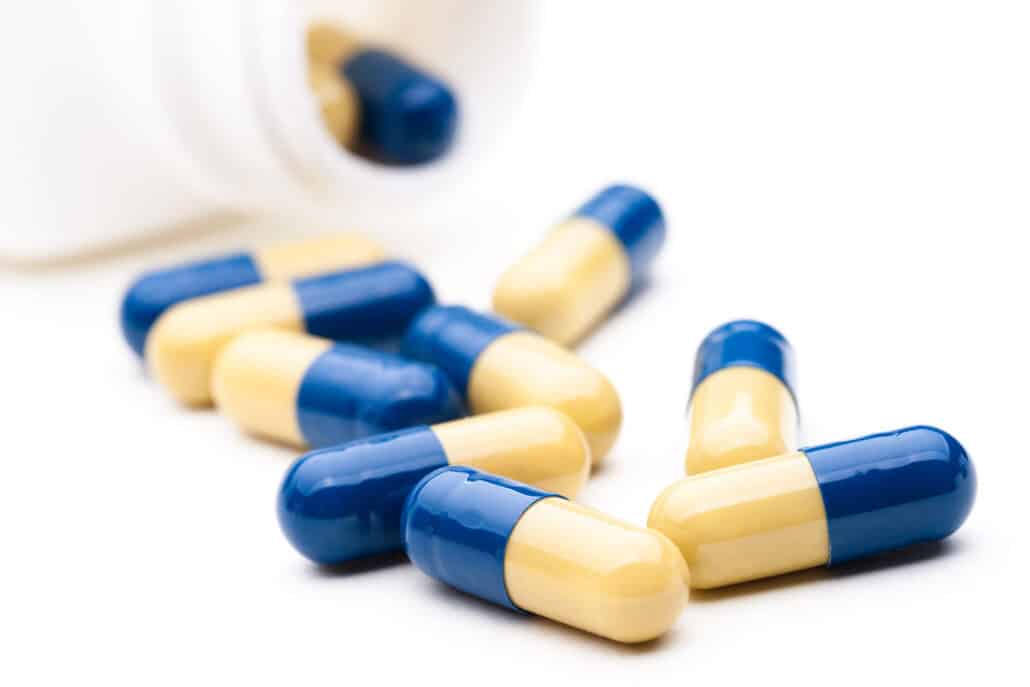Cymbalta (duloxetine) is an FDA-approved prescription medication primarily used to treat depression, anxiety disorders, diabetic peripheral neuropathic pain, fibromyalgia, and certain types of chronic pain.
It belongs to a class of medications called serotonin-norepinephrine reuptake inhibitors (SNRIs).
This class of medications works by affecting the balance of certain neurotransmitters in the brain.
Specifically, it inhibits the reuptake of serotonin and norepinephrine, two chemical messengers that play important roles in mood regulation, pain perception, and various cognitive functions.
When Cymbalta prevents the reabsorption of these neurotransmitters, it essentially keeps their levels in the synaptic space between neurons high enough to enhance their signaling capabilities.
This mechanism helps normalize mood regulation circuits that have become dysregulated in depression and anxiety.

Table of Contents
Cymbalta’s Additional Effects on the Body
Cymbalta has various other effects on the body, and you need to understand them first before you can understand how drinking can alter them.
When a person takes Cymbalta, it’s absorbed in the gastrointestinal tract and reaches peak blood concentrations within 6 hours.
The medication is highly protein-bound in the bloodstream and is metabolized primarily in the liver before being eliminated through urine.
Throughout this journey, it affects a variety of systems:
- Central Nervous System: Besides mood improvement and pain reduction, it can affect sleep patterns, concentration, and energy levels.
- Gastrointestinal System: You can expect some common side effects, including nausea, dry mouth, constipation, or diarrhea, especially during initial treatment.
- Cardiovascular System: May cause high blood pressure or heart rate in some individuals.
- Metabolic Effects: Can occasionally influence appetite and weight.
- Urinary Function: May affect urination patterns in some people.
Note: Most potential side effects tend to diminish after the first few weeks of treatment as the body adjusts to the medication. As long as you’re taking the medication as prescribed, bearing with the side effects of Cymbalta for a week or two will diminish them considerably.

How Does Drinking on Cymbalta Affect the Body?
We understood the normal, now let’s look at the abnormal. The combination of Cymbalta and alcohol is not pleasant. Here’s why:
Enhanced Central Nervous System Depression
Cymbalta and alcohol affect the central nervous system through different mechanisms. When combined, these effects can multiply rather than simply add together.
Alcohol acts as a central nervous system depressant, while Cymbalta modulates neurotransmitters that regulate mood and pain perception.
This interaction creates a synergistic effect that can significantly impair cognitive function, coordination, and judgment beyond what would be expected from alcohol consumption alone.
Amplification of Side Effects
The combination of Cymbalta and alcohol typically intensifies the side effects associated with each substance independently.
Dizziness, drowsiness, and impaired judgment (which are common effects of both Cymbalta and alcohol) become more pronounced when the substances are taken together.
Someone who might normally tolerate a single alcoholic drink may experience exaggerated symptoms when that same drink is consumed while taking Cymbalta.
This can create unpredictable responses that can be particularly dangerous in situations requiring alertness, like driving or working a physically intensive job.
These side effects can become even worse because people may increase their doses. Since alcohol can reduce the effect of Cymbalta, some people may try to counteract that by increasing the dose.
In these cases, we don’t have only the risk of side effects, but also the risk of overdose.
Liver Health Implications
The liver bears the primary responsibility for metabolizing both Cymbalta and alcohol, creating a potential burden when these substances are combined.
Both Cymbalta and alcohol require processing by the liver’s enzyme systems. When consumed simultaneously, they compete for these metabolic pathways, potentially affecting the liver’s capacity to process either substance efficiently.
This competition can lead to higher blood concentrations of both substances remaining in the system for longer periods.
There’s also a concern for individuals with existing liver disease or liver problems, as this additional stress is particularly concerning and may increase the risk of liver damage.
Even for those with healthy liver function, frequent co-consumption can potentially affect liver health over time.
Treatment Efficacy Concerns
Another concerning matter we have is the impact this combination can have on the very conditions Cymbalta is prescribed to treat.
Alcohol is known to exacerbate symptoms of depression and anxiety. When consumed while taking Cymbalta, it can potentially counteract the therapeutic benefits of the medication and possibly worsen the underlying condition.
This creates a concerning scenario where a person’s depression might deepen, potentially increasing suicidal thoughts, a risk already present with antidepressant medications like Cymbalta.
Plus, some individuals take Cymbalta for pain management conditions like neuropathy or fibromyalgia, and even if they don’t get a mental health effect, they’ll get a physical one.
That’s because the diminished effectiveness of the drug can impact symptom control despite ongoing medication.
Blackouts and Memory Impairment
Those who drink alcohol with Cymbalta may experience memory impairments and blackouts in some cases.
Both substances can independently affect memory formation, but together they create a combination that can lead to partial or complete amnesia for events that occur while under their influence.
These blackouts can be concerning because individuals may engage in behaviors without forming memories of these actions.
You can tell how the inability to recall important conversations, decisions, or activities can have serious professional, personal, and safety implications.

How to Handle Alcohol Use Disorder While Taking Cymbalta
If you’re an occasional drinker and had Cymbalta prescribed by a healthcare professional, the easy solution is to stop that occasional alcohol intake.
However, if you or a loved one is unable to stop alcohol abuse because of the withdrawal symptoms, you may ask your healthcare provider to change your medication.
Of course, this isn’t the ideal solution, since you’ll be settling for a less effective medication, plus you’re still unable to quit drinking.
At Long Island Interventions, we understand that overcoming alcohol use can feel overwhelming, especially when combined with medications like Cymbalta.
Whether you’re struggling with alcohol withdrawal symptoms or looking for effective treatment options, we’re here to guide you every step of the way.
Our personalized approach ensures you receive the care and support you need to reclaim your well-being.
1. Comprehensive Assessment and Personalized Treatment Plans
The first step in helping you quit drinking is understanding your unique situation. Our team conducts a thorough assessment of your health conditions, lifestyle, and history of substance use.
This evaluation allows us to create a tailored treatment plan that addresses your specific needs.
- Medical Evaluation: We assess any medical complications, including liver health or potential drug interactions, to ensure safe and effective care.
- Mental Health Support: If you’re dealing with major depressive disorder or anxiety, our team integrates mental health care into your recovery plan.
- Customized Goals: We work with you to set realistic and achievable milestones on your journey to sobriety.
2. Safe and Comfortable Detoxification
Alcohol withdrawal can be challenging, but our medically supervised detox programs make the process as safe and comfortable as possible. We focus on minimizing withdrawal symptoms while ensuring your body begins to heal.
- 24/7 Medical Monitoring: Our experienced professionals monitor your progress around the clock to address any complications promptly.
- Medication-Assisted Treatment (MAT): If needed, we provide medications approved by the Food and Drug Administration (FDA) to ease withdrawal symptoms and reduce cravings.
- Holistic Support: Alongside medical care, we offer therapies like relaxation techniques and nutrition counseling to support your overall well-being.
3. Evidence-Based Therapy for Long-Term Recovery
Quitting alcohol isn’t just about stopping drinking, it’s about building a healthier future. That’s why we offer a range of evidence-based therapies designed to address the root causes of substance use.
- Cognitive Behavioral Therapy (CBT): Learn how to identify and change thought patterns that lead to drinking.
- Group Therapy: Connect with others who understand your journey and build a supportive community.
- Family Counseling: Strengthen relationships and create a network of support at home.
Our therapy programs also focus on preventing relapse by helping you develop coping mechanisms for triggers and stressors.
4. Dual Diagnosis Treatment
Many individuals who struggle with alcohol use also face co-occurring mental health conditions like depression or anxiety. At Long Island Interventions, we specialize in dual diagnosis treatment to ensure both issues are addressed simultaneously.
- Integrated Care: Our team includes experts in psychiatry who work closely with addiction specialists to provide seamless care.
- Focus on Medication Safety: If you’re taking medications like Cymbalta, we ensure that your treatment plan avoids worsening symptoms or causing serotonin syndrome.
- Improved Mental Health: By treating both mental health conditions and substance use together, we help you achieve long-term stability.
5. Ongoing Support After Treatment
Recovery doesn’t end when treatment does. We provide ongoing support through aftercare programs designed to help you maintain sobriety and continue thriving.
- Outpatient Programs: Flexible treatment options allow you to balance recovery with daily responsibilities.
- Sober Living Homes: Safe, supportive environments where you can practice new skills in a structured setting.
- Alumni Networks: Stay connected with peers who share your commitment to sobriety.

Why Choose Long Island Interventions?
At Long Island Interventions, we’re more than just a treatment center, we’re a partner in your journey toward better health. Here’s what sets us apart:
- Experienced Team: Our staff includes licensed counselors, certified addiction specialists, and medical professionals dedicated to your success.
- Compassionate Care: We treat every individual with respect and empathy, creating a welcoming environment where healing can begin.
- Proven Results: Our evidence-based approach has helped countless individuals overcome alcohol use and regain control of their lives.
Take the First Step Today
You don’t have to face this journey alone. It doesn’t matter if you’re dealing with alcohol or other substances. Long Island Interventions is here to help.
Contact us today for a confidential consultation and take the first step toward lasting recovery. Together, we’ll help you build a healthier future free from alcohol dependence.
Published on: 2025-04-26
Updated on: 2025-04-28

